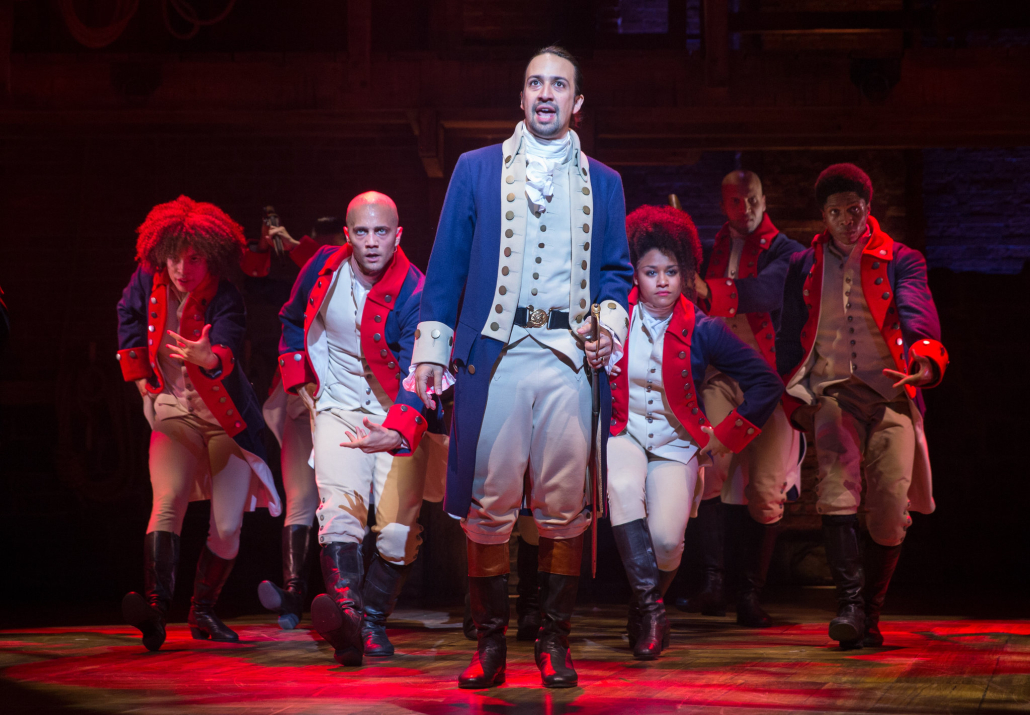TikTalk: There’s no “broad” in Broadway

Amber Ardolino’s backstage clips of “Hamilton” promoted heated online debates over the etiquette of filming during a Broadway show. (Photo courtesy of Sara Krulwich/New York Times)
hen “Hamilton” hit Broadway in August 2015, it caught the attention of theatre and non-theatre kids alike. A musical like no one had seen before — a diverse cast rapping the story of the Founding Fathers — Lin-Manuel Miranda’s work rose in popularity and with it grew the fans.
Of course, when Broadway actress Amber Ardolino started making behind-the-scene TikToks of her life as a “Hamilton” swing (someone who understudies multiple roles), fans ate the content up. They flew to the comment section, filling it with questions and comments and even helped some of her videos reach as many as eight million views.
One of Ardolino’s fan-favorite TikToks is a part of a recurring segment on her account in which she asks followers to comment which dance step she should do during the performance of “The Reynolds Pamphlet.” While most of the show is meticulously choreographed, dancers are given a chance to freestyle during this particular song.
Followers suggest anything from a trending TikTok dance to the itsy bitsy spider. And to prove that she performed the most highly requested dance, Ardolino would post a video clip from that night’s performance.
An entertaining segment that seems like all fun and games accidentally sparked a massive debate in the comments section over the ethics of Broadway bootleg recordings after another “Hamiton” star, John Devereaux, posted a TikTok with this caption:
“When management says you can’t record any of the show but you see a cast member blowing up on Tiktok for doing exactly that.”
The Broadway bootleg debate is as old as time. In many theatre circles, recording a Broadway show is frowned upon. It makes sense; bootlegging in general, is in fact, illegal. Camera glares or flashes can be extremely distracting to the people on stage. If people turn to Youtube to watch a Broadway show, that means less in-person attendance, and, in turn, less money in the performers’ pockets — and it is not like the arts get very much financial backing in the first place.
While all of these frustrations are completely valid and understandable, there’s another side to Broadway bootlegging that Ardolino’s videos brought to light. There is a huge problem of inaccessibility when it comes to Broadway; the high prices of shows make the pool of potential audience members more “narrow” rather than “broad.”
Low-income communities rely on these clips, no matter how short, to get a taste of their favorite shows. However, many people disagree with this notion, such as Tony award-winning actress Stephanie J. Block, known for her work “Wicked,” “Falsettos” and “The Cher Show.” She tweeted:
“No. There is amazing theatre happening EVERYWHERE and at all price points, actually. There are discounts sites, there are two for ones, etc… Broadway is a special place and a special experience, but if planned for and saved for, it can be enjoyed. Speaking from my own life.”
While she does have a point, all of these discount tickets, lottery systems and two-for-ones are probably in high demand, even for those who can afford at value prices for shows. Not only that, not to discredit any of the amazing work that is happening at local theatres, people want to see the “real” thing. They want to see the big-budget productions of “Hamilton,” the versions that come from the cast recordings they are consuming on their walks or commutes.
Many fans in Ardolino’s comments suggest that this is the case. And fans shared these sentiments in the comments of Devereaux’s video, after Ardolino, unfortunately, took down all of the TikToks including clips of the show.
One user, @rosatheswiftie, commented:
“It’s giving…broadway is reserved for the elite and us poors shouldn’t get to see even a clip.”
Another, @melissabecraft, said:
“Not here for the drama. She makes Broadway feel relatable and fun to people who can’t experience it!”
The truth of the matter is that Ardolino’s videos were in no way equivalent to bootlegging full productions of the show and should not be treated as such. The criticism of her content was a little aggressive, but they were also significant in sharing everyday people’s opinions of the inaccessibility of Broadway.
If anything, Ardolino’s video created free marketing for “Hamilton” but more importantly, it provided a safe and exciting community for theatre fans. It gave them a connection to the actors and made them feel like the bright lights of Broadway were not so far from reach — a feat I think benefits the Broadway world perfectly.
Trinity Gomez is a senior writing about TikTok and popular culture. Her column “TikTalk” usually runs every other Thursday.

